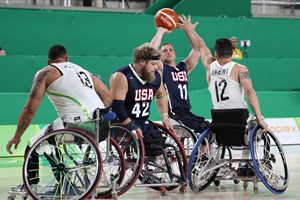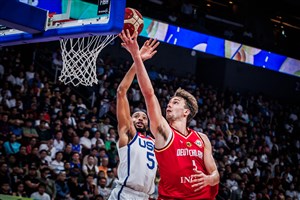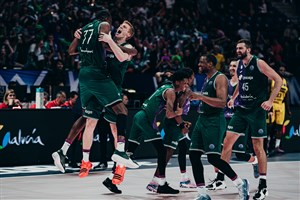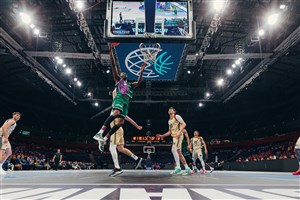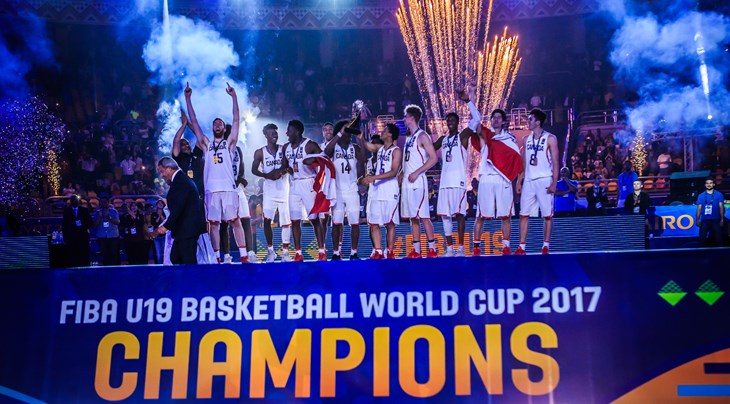
What did we learn from FIBA U19 Basketball World Cup 2017
REGENSBURG (David Hein's Eye on the Future) - The confetti from the FIBA U19 Basketball World Cup 2017 has been cleaned up, the teams are back home and the continental events for the FIBA U17 Basketball World Cup 2018 are already under way. But let's reflect on what we learned in Cairo and the U19 spectacle before the summer gets too far along.
First off, the obvious
Canada is an up-and-coming superpower. Sure the United States can complain about the players in Cairo being a B-team or even a C-team. But don't forget about the group of emerging stars that didn't answer the bell for Canada. Yes, the core quartet of RJ Barrett, Abu Kigab, Danilo Djuricic and Lindell Wigginton would have had made Roy Rana's team. But many of the other Canadians in Cairo would be watching from back home if Canada had their full choice of players.
Yet it was Canada who took down the United States in the Semi-Finals and snapped the Americans' 23-game winning streak dating back to the 2011 Quarter-Finals and spanning two U19 crowns. It was Canada who before that comfortably knocked off a very talented France team in the Quarter-Finals - the country's first win at that stage following three exits in the previous four U19 editions. And then it was Canada who remained grounded after arguably the biggest victory in their country's history and took care of business in the Final against Italy.
And Canada are not going anywhere. They have already qualified for the FIBA U17 Basketball World Cup 2018 - despite missing two of their top three players at the FIBA U16 Americas Championship. And all three of those players - Cashius McNeilly, Addison Patterson and Josh Hemmings - were highly touted enough to be selected for the Jordan Brand Classic Global Game. That trio could also play up a year at the FIBA U19 Basketball World Cup 2019 and perhaps play with RJ Barrett - if the 2017 MVP comes back with the other top players from the 2000 generation, including Emanuel Miller, Jaden Bediako, Andrew Nembhard and Wheza Panzo.
Canada have also started to commit to hosting events such as the FIBA U18 Americas Championship 2018 will be in St. Catharines next summer.
Not a new issue
We didn't really learn much new about the United States. Many of the top guys do not come to the competition because they are in the NBA Draft or need to attend summer school ahead of the start of the collegiate careers. There is no real way to change that for USA Basketball.
The Americans will always be one of the most athletic teams in the competition and also one of the least prepared - the 27-man tryouts for the USA team started on 18 June, 12 just days before the start of the tournament. Could USA Basketball try to push up the selection process and give the coach a bit more time to integrate some things? Sure. Could they try to make sure the coach from the FIBA U18 Americas Championship the previous year is the same for the FIBA U19 Basketball World Cup - unlike this time with John Calipari replacing U18 coach Shaka Smart. Sure. But that won't cause all the problems. Still, this is a team that will alway challenge for the title - if not be the favorite regardless of who comes.
Europe still dominant
Looking at the top half of the standings, it's clear as day that Europe is still a force in world basketball - not like that is a surprise. But Italy took second place, Spain fourth while Germany, Lithuania and France grabbed spots five to seven, respectively.
Italy matched their best showing ever with second place while Spain were one game from returning to the Final for the first time since their 1999 title. Lithuania had a disappointing finish - after shockingly losing to Italy in the Quarter-Finals while Germany and France can both be pleased with their showings after extended absences from the tournament.
Argentina, Puerto Rico strong again
Argentina's appearance in the top eight may have surprised some because they failed to qualify from FIBA U18 Americas Championship, but this team was pretty loaded and showed that the country has more talents coming up the ranks - the likes of Facundo Corvalan, Lautaro Lopez and Leonardo Lema
Puerto Rico meanwhile grabbed ninth place and they have always performed well when they qualify for the FIBA U19 Basketball World Cup. While the Centrobasket team lacked size, they played well thanks to their strong guard play.
New Zealand represent Oceania well
New Zealand was one of the biggest surprises about being in Cairo - after knocking off Australia in the FIBA U18 Oceania Championship 2016 Final. But the Junior Tall Blacks did a good job representing the continent, beating Korea in the opener, giving Argentina and Germany good fights before beating Mali and Egypt to finish 11th overall.
Africa and Asia on even footing
Africa and Africa both had three teams at the competition for the first time - thanks to Egypt hosting the event. And the two continents were pretty much on equal footing. Japan were 10th overall thanks to an All-Star Five showing by Rui Hachimura and were disappointed about losing in the Round of 16 to Italy in the final seconds. But it was still a record best showing for the country.
Korea and Iran finished 14th and 15th, respectively, both with one win - Korea beating Iran, who then knocked off winless Mali. Egypt drew a huge crowd of 9,000 people for their opening win over Puerto Rico and were close to beating Argentina in the Round of 16 before finishing 12th. And 13th place went to Angola, who got an All-Star Five worthy performance from Silvio De Sousa, who averaged 17.3 points and a tournament-best 13.1 rebounds. The African U18 champions finished with three wins over Iran, Mali and Korea to match their best-ever showing.
All in all, it was an exciting FIBA U19 Basketball World Cup 2017. RJ Barrett and Canada gave us memories to last a lifetime - and the tournament also told us some things about the future of some countries.
David Hein
FIBA
FIBA's columnists write on a wide range of topics relating to basketball that are of interest to them. The opinions they express are their own and in no way reflect those of FIBA.
FIBA takes no responsibility and gives no guarantees, warranties or representations, implied or otherwise, for the content or accuracy of the content and opinion expressed in the above article.


